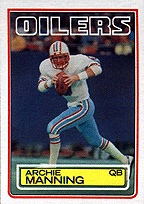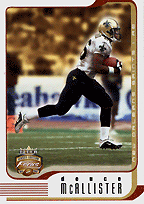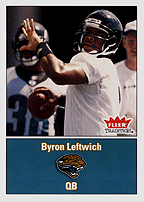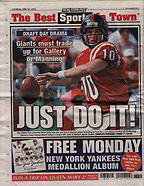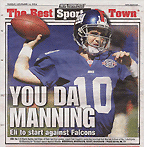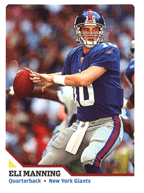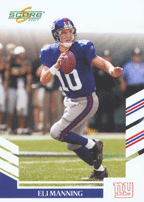| Eli Manning — Biography | |||||
| bio | facts | what they say | my say | ||
For some kids, growing up in the shadow of a famous father is overwhelming.
Others face the challenge of following in the footsteps of an older sibling
who can do no wrong. Imagine then the pressure on Eli Manning. His dad
is a football hero in the family's home state of Mississippi. His brother
is the face of the NFL—and countless corporate sponsors. All Eli
had to do to win a place on the family mantle was lead an under-achieving
team with over-demanding fans to the Super Bowl. This is his story…
| |
GROWING UP
Elisha Nelson Manning was born on January 3, 1981, in New Orleans, Louisiana. (Click here for a complete listing of today's sports birthdays.) The youngest of Archie and Olivia Manning’s three children, Eli entered the world with two older brothers already in tow, Cooper and Peyton. Like all the men in his family, he was destined to be a football star.
Archie began the family’s great gridiron tradition at the University of Mississippi. An Ole Miss legend, he played quarterback for the Rebels from 1967 to 1970. Twice he was a Heisman candidate, and in 1971, the New Orleans Saints made him the second pick overall in the NFL draft. But Archie's pro career never amounted to much. Surrounded by sub-standard talent, he didn't post a winning season during his 11 years with the dreadful ’Aints. Archie then finished off with stints in Houston and Minnesota.
Despite his so-so NFL career, Archie remained a fan favorite and folk hero in Mississippi. There was even a song written about him, “The Ballad of Archie Who.”
Perhaps the most significant development during Archie’s time at Ole Miss came off the field when he met Olivia Williams, the school’s homecoming queen. The two eventually married and settled down with their boys in one of the more exclusive neighborhoods in New Orleans.
As the youngest of the three athletic brothers, Eli was at the bottom of the pecking order. Peyton loved to pick on him, and Eli often looked to Cooper for protection. Peyton, an SEC fanatic, would pin down Eli, pummeling him until he recited all of the teams in the conference. The youngster, who was never much for trivia, learned a lot by default.
Despite his history in the sport, Archie never pushed his sons to play football. That being said, whenever they asked, he would gladly teach them proper techniques of the game. Cooper and Peyton told their father they wanted to be big-time college players. Eli, by contrast, was more of a mama’s boy and didn’t profess much interest in football.
Eli’s younger years were spent with his mom because Archie traveled so often. Older and more mature, Cooper and Peyton were better prepared to deal with the absence of their father. Eli clung to Olivia. The two enjoyed going to movies and dinner together. Not surprisingly, Eli picked up many of his mom’s qualities. Among those was the ability to stay calm in a crisis. Olivia was usually the one who would hold the family together when things went wrong. Eli shared this attitude, which earned him the nickname “Easy.”
Whenever the neighborhood kids gathered for football games, they put Eli at quarterback. Though he wasn’t very fast, he had a strong arm, which helped make the position was a natural for him. By the time Eli entered Isidore Newman High School, where both his brothers had also attended, the comparisons between him and Peyton began.
Living up to his older brother’s reputation was no easy feat. Peyton had been Louisiana’s top prep signal caller, and he and Cooper combined as one of the state’s most lethal passing tandems. Eli started to establish his own identity as a sophomore, completing 139 of 245 passes for 2,340 yards and 24 TDs. The following year, he bettered those marks and led Newman to a 9-1 record and into the state playoffs. In some games, he would call the signals for only three quarters because the team was so far ahead. By season’s end, he was receiving about 20 letters a week from various major college football programs.
Eli had an advantage in the recruiting battle because Peyton and Cooper had gone through the same process. As Eli headed into his senior year, the pressure to choose a school intensified. Ole Miss was an obvious choice. Both Archie and Cooper were Mississippi grads, though the younger Manning never suited up for the Rebels. After being diagnosed with a congenital spinal condition, Cooper decided to give up football, rather than risk being paralyzed.
![]()

Peyton, meanwhile, drove right past Oxford. Singing “Rocky Top” all the way to Knoxville, Tennessee, he donned the orange and white of the Volunteers. At the time, Ole Miss was rumored to be under NCAA investigation, so Peyton chose to avoid a pitfall that might derail his career.
In the summer of 1998, Eli attended a football camp at Ole Miss, a move that fans took as an indication of his desire to become a Rebel. But the teenager was still undecided. Tennessee worked hard to lure him, as did Georgia, Texas, LSU and Florida.
In the midst of the recruiting frenzy, Eli enjoyed a great senior year at Newman. Again he quarterbacked the team to the playoffs, posting an 11-1 record. Eli ended his high school career with 7,389 yards and 89 touchdowns, 200 more yards than Peyton but three less scores.
As the clock ticked away on his college decision, Eli received an interesting call from David Cutcliffe. Formerly Tennessee’s offensive coordinator, Cutcliffe had been hired as the head coach at Ole Miss. Eli knew how much Cutcliffe had done to help Peyton improve his game. The news that he was now in charge of the Rebel program was all Eli needed to hear. The 18-year-old followed his father’s footsteps and made his way to Oxford.
The hype began as soon as Eli stepped on campus. The school offered to un-retire Archie’s number 18, but Eli declined. Instead, he went with #10.
Eli got his first taste of Ole Miss football in an intersquad scrimmage at Vaught-Hemingway Stadium. While he made a good showing, he was still third on the depth chart, with veteran Romaro Miller assuming the starting role. In fact, determined not to rush his young quarterback along, Cutcliffe redshirted Eli for the 1999 season. The frosh watched from the sidelines at the Rebels went 8-4 and won the Independence Bowl, led by running back Deuce McAllister.
Eli landed himself in hot water after the campaign when he was arrested and briefly jailed for public drunkenness. Truly embarrassed by the incident, the 19-year-old decided to buckle down and focus on school and football.
ON THE RISE
As the 2000 season got underway, the Rebels found themselves ranked 18th in the AP poll, thanks in large part to McAllister and Miller, both of whom were back for their senior years. Eli settled in as Miller's backup and saw little playing time. Ole Miss went 7-5 and earned a berth against West Virginia in the Music City Bowl. That's where Eli got his first real chance to shine.
Down 49-16 in the fourth quarter, the Rebels needed a spark. Cutcliffe inserted Eli, and he played brilliantly. The redshirt freshman completed 12 of 20 passes for 167 yards and three touchdowns. While that wasn't enough to secure a victory, the teenager's sparkling performance gave the world a taste on what awaited when he took the helm in 2001.
The "Eli Manning Era" officially kicked off at Ole Miss the following fall. Miller had graduated, and McAllister had been snatched up in the first round of the NFL draft by New Orleans. Top wide receiver Grant Heard was also gone. With the Rebel defense also full of holes and lacking depth, Cutcliffe knew his offense—namely Eli—would have to carry the load. The sophomore’s supporting cast included running back Joe Gunn, wideouts Omar Rayford and Jamie Armstrong, and tight end Doug Zeigler. Guard Terrence Metcalf anchored the offensive line.
Ole Miss surprised many in the SEC by starting 6-1. Then Eli and Rebels ran into Arkansas. In one of the most memorable games in college football history, they lost to the Razorbacks 58-56 in seven overtimes. Eli threw for 312 yards and six touchdowns.
The draining defeat to Arkansas sent Ole Miss into a slide. Dropping two of their last three, the Rebels ended at 7-4. Eli’s play was the saving grace to the campaign’s disappointing conclusion. He completed 63.5 percent of his passes for 31 touchdowns against only nine interceptions. In all, Eli set or tied 17 school records.
Going into the 2002 season, the Rebels faced many of the same problems that had plagued them the year before. Their undersized defense had allowed nearly 30 points a game in ’01, and there was no reason to expect much improvement. On offense, senior Robert Williams and junior Ronald McClendon were fighting to replace Gunn. Metcalf, meanwhile, was now a Chicago Bear, leaving 317-pound Tre Stallings as the beefiest of the Ole Miss offensive linemen.
Before the season, Archie asked the Rebels not to promote Eli for the Heisman. Peyton had experienced the pressure of those expectations in 1997, and the Manning family didn’t enjoy the media circus. Ole Miss respected Archie’s wishes.
Again the Rebels broke from the gate quickly, winning five of their first six. After an upset of 20th-ranked Florida, they looked like a sure bowl contender. But another slow finish spoiled the year, including a heartbreaking loss to Auburn. Down 31-24 late in the contest, Eli worked his magic, guiding the team to the Tigers’ eight-yard line. On third down, he scanned the field and forced a throw to tie the score. Auburn safety Travaris Robinson read the play and intercepted the pass. The Tigers then ran out the clock for their third straight victory over Ole Miss.
The Rebels finished the regular season at 6-6, which was good enough for a bid against Nebraska in the Independence Bowl. Their 27-23 victory put a nice spin on an otherwise mediocre season—except for the play of Eli.
In 13 games, he passed
for 3,401 yards and 21 touchdowns. His 15 interceptions aside, he was
still a hot commodity, particularly in the eyes of pro scouts. Eli was
often counted on to win games by himself, so it was only natural that
his interception total was high. With the riches of the NFL on his radar
screen, Eli had thought long and hard about entering the draft.
The senior’s decision came down to his competitive fire. Eli stayed for his final season with the hope of leading Ole Miss to the SEC Championship Game for the first time in school history. Eli also realized that the draft already had three very strong quarterbacks: Southern California’s Carson Palmer, Marshall’s Byron Leftwich and Florida’s Rex Grossman. That meant Eli would likely be a late first-round pick at best. By returning to the Rebels, he positioned himself better for the 2004 draft—and made himself one of the preseason favorites for the Heisman.
Eli entered the 2003 season with an excellent receiving unit led by senior Chris Collins and junior Bill Flowers. Hurting him was the Ole Miss running game. At 94.3 yards per game, it was the worst in the SEC. The defense also needed help, especially with the loss of two starters, linebacker Eddie Strong and nose tackle Matt Grier.
The Rebels split their first two games, setting up a crucial contest against Florida in the Swamp. No Manning had ever beaten the Gators on their home turf. Peyton’s memories of were particularly bothersome.
This time around, however, Eli restored the family pride. Trailing 17-13, he directed a late touchdown drive capped by Vashon Pearson’s burst across the goal line with 1:10 left on the clock. His touchdown was fitting. The Rebels rushed for a robust 223 yards on the day. Their three-point win created momentum for the rest of the season.
Indeed, on the strength of the Florida victory, Eli spearheaded a six-game winning streak. The offense continued to put points on the board, and the defense stepped it up as well. In October, the team surrendered a total of 52 points. Ole Miss then hung on in a pair of close games, a 43-40 win over South Carolina and a 24-20 win at Auburn. That set up a key conference battle against LSU. A victory by Ole Miss would clinch the SEC West and a bid to play for the conference championship.
LSU’s defense held the Ole Miss offense in check for the first three quarters, but Eli rallied the team in the fourth. Down by three points with under five minutes to go, he moved the Rebels in field-goal range. Unfortunately, Jonathan Nichols botched a 36-yard attempt, his second miss of the day. Eli and his teammate left the field demoralized by their 17-14 defeat.
The Rebels still had a chance at the SEC Championship Game—if LSU lost to Arkansas and Ole Miss beat Mississippi State (in the annual Egg Bowl). But the Tigers were on a roll. They ran the table and wound up as co-National Champions with USC.
Thanks to Eli, Ole Miss also won out, including a 31-28 victory over Oklahoma State in the Cotton Bowl. At 10-3, the Rebels posted nine regular-season victories for the first time in 13 years. Eli was the story, passing for 3,600 yards and 29 touchdowns.
The voters rewarded
Eli with a slew of honors, including the Maxwell Award as the nation’s
best all-around player. He earned the Johnny Unitas Golden Arm Award,
National Football Foundation and College Hall of Fame Scholar Athlete
Award, and the Sporting News Radio Socrates Award. Eli was also named
the SEC Player of the Year. When it came time for the Heisman balloting,
however, he couldn’t muster the necessary support. Oklahoma’s
Jason White walked away with the trophy.
Up next for Eli was the NFL draft. The San Diego Chargers, in the market for a quarterback, held the top pick. Most experts rated Eli as the best passer available, though Ben Roethlisberger and Philip Rivers were also highly touted. The talent pool didn’t dry up there—Tulane’s J.P. Losman was also projected to be a late first rounder.
With the Mannings pulling the strings, what proceeded next was one of the odder moments in draft history. Afraid the Chargers might be the current-day version of his Saints, Archie made it clear that he didn’t want his youngest son stuck on a loser. He instructed Eli’s agent, Tom Condon, to call San Diego general manager A.J. Smith and advise him against taking Eli. Condon added that the New York Giants would be the best fit. Archie later said that he knew nothing about that remark.
On draft day, the room was rife with rumor as commissioner Paul Tagliabue walked to the podium to announce the #1 selection. When he called out Eli, the boos rained down from New York fans. Eli held up a Chargers jersey, with no trace of a smile on his face. Three picks later, the Giants tabbed Rivers.
Minutes later, Eli sat down for a press conference, saying he would not play for San Diego and would instead pursue a law degree. Then came word of a trade between the Chargers and Giants. Eli was suddenly New York bound. Beaming, he headed to Giants Stadium, where he enjoyed a photo-op with new head coach Tom Coughlin.
Though New York already had a proven quarterback in Kerry Collins, GM Ernie Acorsi couldn’t pass on Eli, whom he viewed as a potential All-Pro. Collins read the writing on the wall and left for Oakland. As an insurance policy, the Giants signed Kurt Warner. Also on the roster was Jesse Palmer, whose biggest headlines since college had been generated by his appearance on the TV show, “The Bachelor.”
In his first mini-camp, Eli looked like a rookie, fumbling snaps and missing receivers. Though Coughlin said the starting job was up for grabs, it was fairly clear by the beginning of training camp that Warner would get the nod. Eli was still learning the ropes, and with New York's playoff hopes slim at best, there was no reason to rush the youngster along.
The Giants surprised most onlookers by starting strong. Tiki Barber was enjoying the best year of his career, Warner was running the offense efficiently, and the defense, behind Michael Strahan and first-year coordinator Tim Lewis, was swarming. But injuries soon took their toll. When Strahan went down for the season, Big Blue was sunk.
As New York dropped
in the standings, Coughlin weighed the merits of playing Eli. The rookie
had actually made his debut in the season opener in Philly, at the end
of a blowout. In limited action, he completed three of nine passes for
66 yards. The most notable thing Eli did was absorb a hellacious hit by
an Eagle linebacker. The idea of exposing Eli to more punishment was not
the most welcome of prospects.
By November, however, the offense had become stagnant, and Coughlin had seen enough of Warner. With the Giants set to host the Atlanta Falcons, the coach turned to Eli. Most New York fans applauded the move, even as Eli struggled to adjust to the pro game. In his start against Atlanta, he hit on just 17 of 37 attempts for 162 yards. Though Eli connected with Jeremy Shockey for his first career touchdown pass, he also threw two interceptions and often looked completely confused. The Giants lost 14-10.
It was more of the same—and often even worse—over his next three games. In defeats to the Eagles, Washington Redskins and Baltimore Ravens, Eli was awful. The 37-14 loss to the Ravens was the low point. He completed only four passes, and fans and the media wondered afterward whether New York had made a colossal mistake in mortgaging the future on the young quarterback.
MAKING HIS MARK
To his credit, Eli weathered all the criticism without complaint. His stoicism was not lost on his teammates, who rallied around him on the practice field and in the locker room. On the second-to-last weekend of the regular season, the Giants gave the Steelers all they could handle, falling in a 33-30 barnburner. Eli withstood constant pressure from the hard-hitting Pittsburgh defense, passing for 182 yards and two TDs.
A week later, Eli engineered the first victory of his career, a win over the visiting Dallas Cowboys. With the New York fans treating the matchup like a playoff contest, Eli responded with incredible poise. After Dallas took a three-point lead in the fourth quarter, he led the Giants on a game-winning drive. Most notable was the play he called with Big Blue knocking on the door with time running down. With the Cowboy defense backing off the line of scrimmage near the goal line, Eli audibled to barber on a quick inside hand-off. When the Pro Bowler powered into the end zone, the Giants celebrated a 28-24 win.
Warner opted out of his contract in 2005, removing any thought that Eli would not be the Giants’ quarterback. Coughlin went into the year with an offense that demanded only the Eli manage the offense. He was rarely forced to make game-winning plays. Eli responded with decent performances in his first two games—both victories—and played very well when the Giants traveled to San Diego in Week 3. That was a test because the Chargers' fans let Eli have it. He held up his end of the deal and threw for 352 yards. Unfortunately, the defense could not stop Ladainian Tomlinson and company, and the Giants fell 45–23.
The team rebounded with a 44–24 victory over the St. Louis Rams, and Eli set a new career high with four TD passes. Next he played brilliantly against Denver, engineering in a fourth-quarter comeback victory over the Broncos. He also led a late comeback against the Vikings (though Minnesota won).
The ups and downs continued throughout the year, but the Giants played winning football. Their defense was dependable, and with weapons like Barber, Amani Toomer and Jeremy Shockey at his disposal, Eli always had appealing options. Barber, in particular, was sensational, racking up more than 2,300 total yards on runs and passes.
Eli finished the season with 294 completions on 557 attempts for 3,762 yards. His 24 TD tosses placed him near the top of the list in the NFC. Unfortunately, so did his 17 interceptions. The Giants scored a whopping 422 points—despite the fact that Eli's QB rating was one of the worst in the league. He seemed to tire down the stretch, and fans grew tired of his exasperated "Why me?" expression when things did not go his way.
Questions about Eli dogged the Giants as they headed into the playoffs. At 11-5, they were NFC East champs, but their confidence seemed to wane. It showed when the Carolina Panthers spanked them 23–0 in front of the Giants Stadium faithful. Eli threw three interceptions in the second half. The loss marked the first time in 25 years that a home team had been shutout in the playoffs.
The fans were willing to forgive and forget when the 2006 season began. New York’s opener dominated the NFL headlines, as the Giants hosted the Colts. The game was billed as a Manning family feud. Eli played well, but Peyton got the win. Eli shrugged off the loss and completed a brilliant comeback a week later win over the Eagles. Newcomer Plaxico Burress soon became Eli’s favorite target, as the Giants went 6–2 in a solid first half of the campaign.
Then, as injuries decimated the roster, the wheels came off. Left tackle Luke Pettigout went out with a broken leg, leaving Eli open to blindside sacks. Instead of commanding the pocket, he seemed jumpy when the Giants needed good throws. New York quickly fell apart.
| |
New York fans felt that it was time for Eli to step up and take control of the club. When he did not, Barber, Shockey and every sports jock in the tri-state area began questioning his leadership abilities. Coughlin, meanwhile, was on the verge of being run out of town. The guy who saved everyone's job was Barber. In the team’s last regular-season game, he rumbled for 234 yards and three touchdowns in a win over the Redskins Thanks to a quirk of the standings, the 8-8 Giants made the playoffs.
The Giants traveled to Philly to take on the Eagles. Barber kept New York in the game, and Eli threw for a pair of touchdowns. With his team down in the fourth quarter, he led his teammate to the tying score. The Eagles, however, responded with a drive of their won and kicked a last-second field goal to win.
The 2007 Giants did not inspire much confidence. Whether or not Eli took a major step forward in his career, the rest of the team did not have the look of a postseason contender. Barber was gone, Burress had a bad ankle, Toomer had lost a step, and Strahan wasn't even sure if he wanted to play. Compounding the problems on defense were a thin linebacking crew and an inexperienced secondary.
The poor prognosis was confirmed in September, when the Giants dropped important games to the Cowboys and Green Bay Packers. Things got worse when Eli—already nursing a sore elbow—sprained his shoulder. The season was on the verge of slipping when, suddenly and quite unexpectedly, New York pulled together against the Redskins and staged a dramatic comeback. The 24-17 win was capped by a classic goal-line stand. Against the Eagles a week later, the much-maligned defense set an NFL record with 12 sacks in a 16–3 victory.
At 2–2, the Giants appeared to have new life. Against the Jets, they recovered from a dismal first half, with Eli rallying the team to a second-half victory. A few weeks later, in a Monday Night Football tilt with the Falcons, Eli aired it out for 300-plus yards in a commanding 31–10 victory. As impressive as their turnaround was, the Giants were playing for a Wild Card at this point. The Cowboys and Packers were the class of the NFC, each headed for a 13-win season.
Eli and the Giants kept rolling with workmanlike wins over the San Francisco 49ers and Miami Dolphins. He was using his weapons effectively and managing the offense efficiently. Brandon Jacobs, who replaced Barber at halfback, gave the team a battering ram in the backfield. When he was not feeling it, Ruben Droughns and Ahmad Bradshaw carried the ball. Shockey and Toomer proved to be reliable possession receivers, and Burress, though hobbled, kept defenses honest as a bona fide touchdown threat.
Eli’s teammates trusted him, even if the fans and management did not. After a second loss to Dallas, co-owner John Mara gave his young quarterback a public dressing down. Eli responded with a solid game against the Detroit Lions, but spit the bit a week later against the Vikings. In an embarrassing 41–17 defeat, he threw three interceptions that were returned for touchdowns. With Eli’s critics screaming for blood, the Giants managed to limp into the season's final week with a playoff spot secured.
New York’s final opponent of the regular season was New England. At 15-0, the Pats were on a mission. A loss for the Giants would mean nothing in terms of the playoff seeding, so the debate raged as to whether Coughlin should play his starters or rest them for their first-round encounter with the Tampa Bay Buccaneers.
Coughlin told his team to play to win. Eli knew what he was up against and played his best game of the year. He made good throws and good decisions, and handed the Giants a fourth-quarter lead. Though New York fell 38-35, Eli’s four TD passes gave the club an incredible boost. To a man, the Giants went into the playoffs believing they could beat anyone. After all, they had come up a field goal short against the best team in history.
Eli’s final numbers were in line with his past performances—3,000-plus yards, 23 TDs, 297 completions, 20 interceptions. Clearly, however, this was a more evolved quarterback heading into his third postseason.
Against the Bucs, Eli rallied the Giants from an early deficit to win 24–14. He completed 20 of 27 passes, including two for touchdowns. Most important, he did not throw an interception against the pesky Tampa Bay defense. He engineered a game-changing third-quarter scoring drive and put an exclamation point on the day in the fourth quarter by faking Ronde Barber out of his jock on a pump fake to Kevin Boss (filling in for Shockey after a season-ending injury) and then hitting Toomer for the TD that sealed the deal. After the game, Coughlin grabbed Eli and congratulated him. In the same breath, the coach reminded him that he couldn't be content with just this one victory.
Eli wasn't. He was even better a week later against the Cowboys in Dallas. He made key plays when the Giants needed them, while his counterpart, Tony Romo, did not. Once again, Eli threw for two TDs and no interceptions. The difference in the game came down to the basics of football—the Cowboys went away from what had made them successful, and the Giants stuck to their plan. The final score was 21-17, but the game was in doubt until the very last play.
New York’s amazing run continued in the NFC Championship Game against the Packers on a frigid Sunday in Green Bay. Once again, Eli played a near-flawless game. More impressive was how he kept his composure when receivers dropped crucial passes and kicker Lawrence Tynes missed two potential game-winning field goals in the fourth quarter. The Giants outplayed the Packers in every facet of the game, and Eli read the Green Bay defense perfectly. When they crowded into the box to stop Jacobs, he found Burress and Toomer in single coverage. When the Packers played the pass, he sent Jacobs and Bradshaw crashing through the line.
Even so, with the game tied 20–20 and the Packers winning the overtime flip, the odds still did not look good for the Giants. But fate smiled upon the boys in blue when Brett Favre forced pass that was picked off by Cory Webster. A few plays later, Tynes redeemed himself with a 47-yard field goal. Eli and his teammates had beaten three Super Bowl champions—all on the road—to win the conference championship.
In the span of a single month, Eli had quieted his critics, erased any lingering doubts of his teammates, and established himself as a quarterback who had the skills, smarts and passion to lift his team to the Super Bowl. His next challenge was to end New England's hopes of a perfect season and deliver another championship to New York.
The pundits expected
a high-scoring affair in Super Bowl 42, but the Giants had other ideas.
They ate up a huge chunk of clock on their opening drive and took a 3-0
lead. New York was also happy to let the Patriots take their sweet time
when they had the ball. The score at halftime was 7-3.
Eli played well in the first half, though he did throw his first interception of the postseason. The turnover, however, wasn't completely his fault. He zipped a pass to the hands of Steve Smith, but the ball slipped through his fingers and into the arms of a New England defender.
The most significant development of the first two quarters was the way the Giants pressured Tom Brady. New York battered the New England quarterback, never allowing him to feel at ease in the pocket. The constant harassment took its toll as the game moved into the fourth quarter.
The final period is also when Eli stepped into the spotlight. First, he led the Giants on an 80-yard drive capped by a touchdown pass to little-used receiver David Tyree. Eli was masterful on the possession. The big play was a 45-yard connection with Boss.
Brady responded with a TD march of his own, putting the Pats ahead with a scoring strike to Randy Moss. Eli and the Giants got the ball back at their own 17-yard line with 2:42 left. They had all three of their timeouts. It was the kind of situation Eli had dreamed about as kid.
Eli hit on a first-down a pass to Toomer that netted 11 yards. The Giants then stalled and faced a crucial decision. Needing less than a yard on fourth down from the 37-yard-line, Eli handed to Jacobs, who reached ahead for the necessary yardage.
From there, it was all Eli—though it wasn't always pretty. On a breathtaking third-down play, he broke free as the pocket collapsed around him and fired the ball 30 yards downfield to Tyree, who was surrounded by New England defenders. Tyree out-jumped the coverage and held on for a miracle catch. On another key third-down snap, Eli scramble free again, and this time zipped a throw to Smith for a first down.
On the next play. Eli lofted a pass to the left corner of the end zone. After shaking free from his man, Burress cradled the ball for the winning score. Giants fans across the nation leapt in celebration. Big Blue has just secured its third Super Bowl title. The Patriots had one more possession, but Eli had left them only 35 seconds. Brady could do nothing, and New York won 17-14.
Afterward, there was little debate about the game's MVP. When it counted most, Eli had authored his most inspirational performance as a Giant. He was at his best in the fourth quarter, tossing a pair of picture-perfect touchdown passes.
Needless to say, Eli did a lot of growing up during the '07 season. The game started getting easier for him. He began to spot opportunities and avoid traps, and was willing to take what an opponent gave him. When he was well-focused and playing pain-free, Eli was one of the NFL’s top quarterbacks. He took a huge step toward becoming a championship-caliber leader. Eli no longer has to answer his critics. Not that he ever did. The quiet confidence and even temperament—traits that once antagonized fans and the media—now serve him wonderfully as he assumes his rightful place in the family business.
ELI THE PLAYER
Eli has all of the tools to be a great quarterback. At 6-4 and well over 200 pounds, he is almost a clone of his brother Peyton. He makes the proper reads before the snap and has great touch on his throws. He has a strong and accurate arm, and shows all the athleticism of his father. Eli is quick in his drops and maintains control while moving around in the pocket.
Eli is a classic pocket passer, just like his father taught him to be. He has superior mechanics, and durability has yet to be a question.
After his antics in the draft, Eli may have to work a little harder to get his teammates to respond to him. But that shouldn’t bother him. He’s mentally tough, and can process information very fast, which allows him to make good decisions on the field.
Eli used to lead by example. But that changed at Ole Miss, when he learned to be more vocal. He was often the guy in the locker room firing up teammates with a passionate speech. The question is how long will it before his NFL teammates start listening.
| Eli Manning — Biography | |||||
| bio | facts | what they say | my say | ||
© Copyright 2009 Black Book Partners, LLC. All rights reserved.
